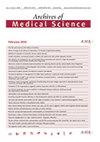血液代谢物与乳腺癌之间的因果关系
IF 3
4区 医学
Q1 MEDICINE, GENERAL & INTERNAL
引用次数: 0
摘要
血液代谢物与乳腺癌之间的关系仍不清楚。我们进行了一项系统的双样本孟德尔随机化(MR)分析,以确定关键的人体血液代谢物,并发现乳腺癌发病的潜在生物标志物。工具变量选自一项队列研究,该研究对 7824 名参与者的 453 项代谢特征进行了分析。乳腺癌发病率数据来自一项涉及 138,389 例病例和 240,341 例对照的大型队列研究。采用逆方差加权法和 MR-Egger 回归法评估了人体血液代谢物与乳腺癌发病率之间的因果关系。确定了五种人体血液代谢物作为乳腺癌的生物标志物:丝氨酸(OR,2. 25;95% CI:1.18-4.27)、10-十一碳烯酸酯(11:1n1)(OR,1.38;95% CI:1.00-1.90)、X-12696(OR,2.15;95% CI:1.14-4.08)、X-14626(OR,1.68;95% CI:1.15-2.46)和琥珀酰肉碱(OR,1.58;95% CI:1.06-2.34)。这项代谢组学研究确定了五种人体血液代谢物--丝氨酸、10-十一碳烯酸酯(11:1n1)、X-12696、X-14626 和琥珀酰肉碱--作为评估乳腺癌风险的潜在生物标志物。在这些代谢物中,丝氨酸和 X-12696 与罹患乳腺癌的可能性关系最大。本文章由计算机程序翻译,如有差异,请以英文原文为准。
Causal associations between blood metabolites and breast cancer
The associations between blood metabolites and breast cancer remain unclear. We conducted a systematic two-sample Mendelian randomization (MR) analysis to identify key human blood metabolites and uncover potential biomarkers for breast cancer development.The data were extracted from large-scale genome-wide association study (GWAS) public databases. Instrumental variables were selected from a cohort study of 453 metabolic profiles from 7,824 participants. Breast cancer incidence data were obtained from a large cohort study involving 138,389 cases and 240,341 controls. Causal associations between human blood metabolites and breast cancer incidence were assessed using inverse-variance weighting, and MR-Egger regression.Five human blood metabolites were identified as biomarkers for breast cancer: serine (OR, 2.25; 95% CI: 1.18–4.27), 10-undecenoate (11:1n1) (OR, 1.38; 95% CI: 1.00–1.90), X-12696 (OR, 2.15; 95% CI: 1.14–4.08), X-14626 (OR, 1.68; 95% CI: 1.15–2.46), and succinyl carnitine (OR, 1.58; 95% CI: 1.06–2.34). The sensitivity analysis results indicate no pleiotropy between the metabolites and breast cancer risk, confirming the robustness of the findings.This study in metabolomics research identified five human blood metabolites — serine, 10-undecenoate (11:1n1), X-12696, X-14626, and succinylcarnitine — as potential biomarkers for assessing breast cancer risk. Among these metabolites, serine and X-12696 showed the strongest associations with the likelihood of developing breast cancer.
求助全文
通过发布文献求助,成功后即可免费获取论文全文。
去求助
来源期刊

Archives of Medical Science
医学-医学:内科
CiteScore
4.90
自引率
7.90%
发文量
139
审稿时长
1.7 months
期刊介绍:
Archives of Medical Science (AMS) publishes high quality original articles and reviews of recognized scientists that deal with all scientific medicine. AMS opens the possibilities for young, capable scientists. The journal would like to give them a chance to have a publication following matter-of-fact, professional review by outstanding, famous medical scientists. Thanks to that they will have an opportunity to present their study results and/or receive useful advice about the mistakes they have made so far.
The second equally important aim is a presentation of review manuscripts of recognized scientists about the educational capacity, in order that young scientists, often at the beginning of their scientific carrier, could constantly deepen their medical knowledge and be up-to-date with current guidelines and trends in world-wide medicine. The fact that our educational articles are written by world-famous scientists determines their innovation and the highest quality.
 求助内容:
求助内容: 应助结果提醒方式:
应助结果提醒方式:


